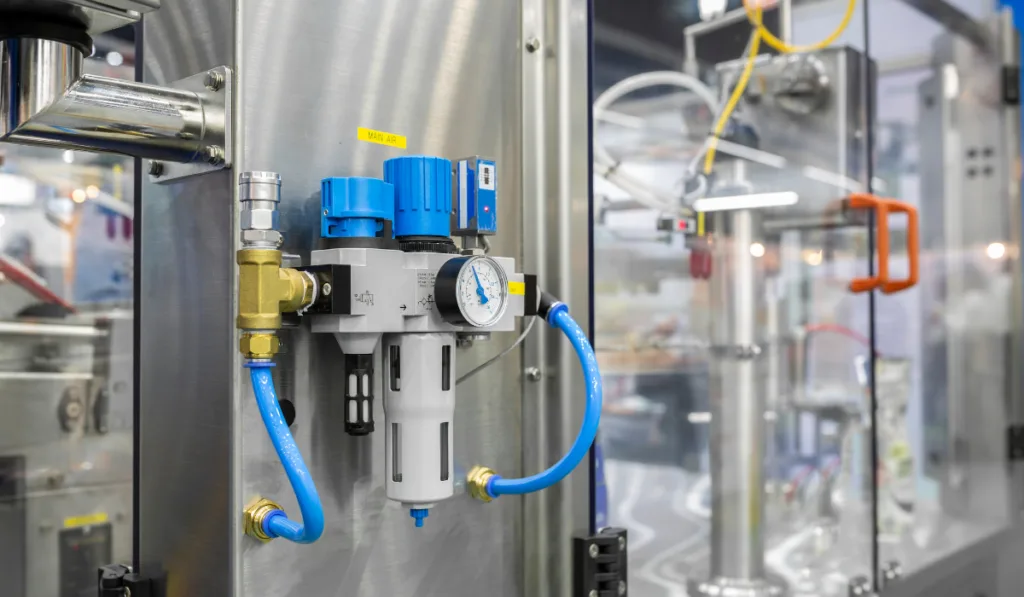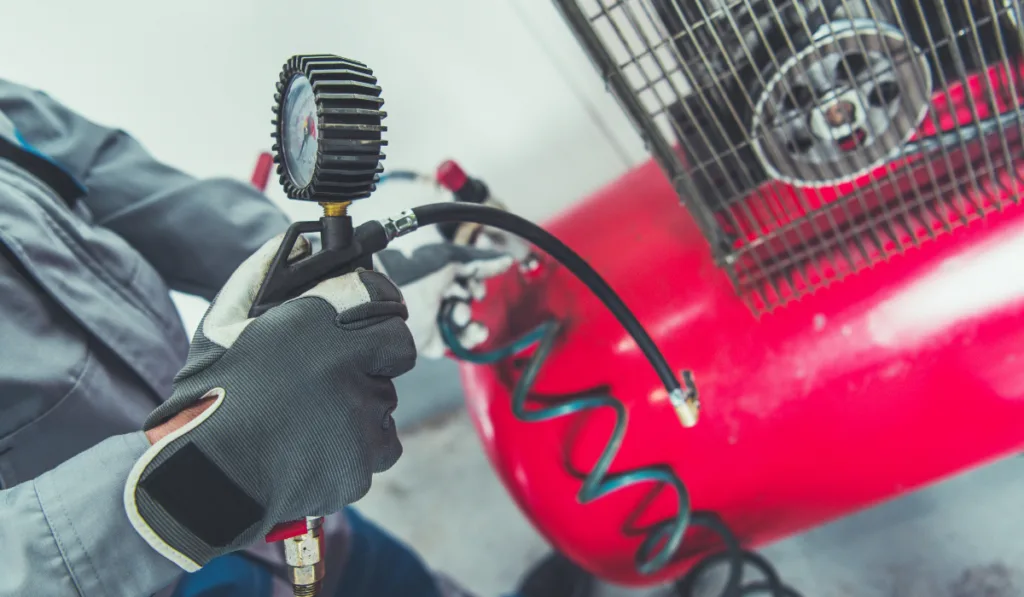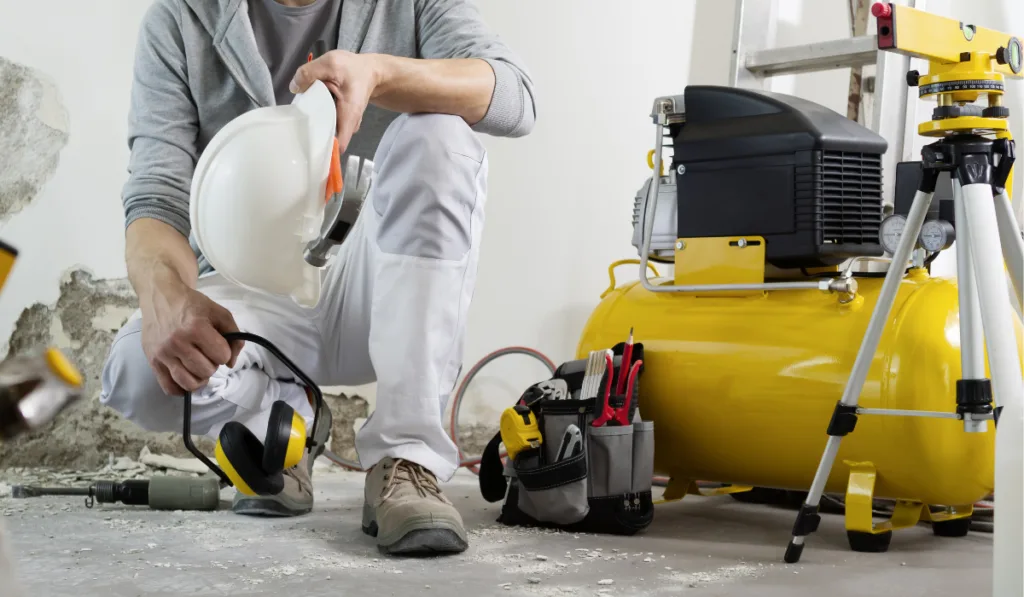*This post may have affiliate links, which means I may receive commissions if you choose to purchase through links I provide (at no extra cost to you). As an Amazon Associate, I earn from qualifying purchases. Please read my disclaimer for additional details.
Air compressors power the pneumatic tools and equipment used on job sites, in basements, and on home improvement projects using only high-pressure air. They come in a variety of sizes, styles, and weights, but in practice, the only real options are to use an oil-lubricated compressor or choose an oil-free design.
So, which is the better air compressor option – oil or oil-free?
When it comes to oil or oil-free air compressors, oil-free air compressors are better for DIY projects, but both styles have their applications. For instance, oil compressors last longer and are more durable for heavy-duty projects.

However, the air compressor market is a fast-changing industry. Thus, you need a good understanding of how air compressors work with your needs, project, and property.
This article will tell you what you need to know about oil-lubricated and oil-free air compressors so that you can make an educated decision about which one is best for you.
Table of Contents
The Oil-Lubricated vs. Oil-Free Debate
Air compressors compress air until it reaches a high enough pressure to serve as a hydraulic fluid. It is this compressed air that then drives your tools and serves as the main advantage of using air tools. You get tons of power from a single, small motor.
However, air compressors have many moving parts to ensure they can reach and maintain the pressures needed for your equipment.
A typical compressor will have a combination of cylinder pistons, valves, crankshafts, and connecting rods, and each part needs some type of lubricant to reduce friction, heat, and wear to keep working correctly.
The main difference between an oil-based and an oil-free compressor is the nature of this lubricant. Air compressors typically use only two types of lubricants, as noted by Power Equipment Direct.
These two lubricants are oil and a unique material coating.
- Splash Oil-Lubricated Compressors – Oil-based compressors use rotating dippers that splash oil onto everything. As these dippers extend from the connecting rod, the splashing occurs every cycle.
- Oil-Free Lubrication – Oil-free compressors replace the oil and dippers with a special chemical coating. This coating is applied at the factory and effectively self-lubricates everything but the sealed bearings which bathe in grease.
Splash Oil Air Compressors

As the most popular type of air compressor, oil-lubricated air compressors are durable for heavy-duty use. Despite the constant splashing of oil, these compressors are effectively silent, making them great for quiet neighborhoods.
However, the extra oil infrastructure does make it heavy. Oil air compressors have many parts, all of which must be oiled to work. They are meant for industrial applications where they will sit without much movement.
They also require constant maintenance and the occasional oil changes, and they come with a higher price tag. However, the added weight does make them very durable, which may make them worth the price.
Some of the pros and cons of splash oil air compressors are:
Pros:
- Very durable and heavy-duty
- Low noise
Cons:
- Heavy
- Many parts that require constant maintenance
- Expensive
If a splash oil air compressor is what you want, try the WEN 2202 20-Gallon Oil-Lubricated Portable Vertical Air Compressor. Some of its features include:
- Provides air flow rates of 3.8 CFM at 90 PSI and 5.0 CFM at 40 PSI
- 20-gallon tank constructed with reinforced steel for a maximum pressure of 135 PSI
- Features an easy-to-reach quick drain valve, 1/4-inch NPT quick coupler and two pressure gauges
- 3.5 and 5 CFM Air Flow Rates
- Easy-to-reach quick drain valve
- Durable reinforced steel construction
Air Compressor Oil is NOT Motor Oil
You must know that the oil used in oil-lubricated compressors is not motor oil. It is a special detergent-free, synthetic blend explicitly made for the ball bearings inside the compressor.
Air compressor oil is so specialized that you never want to use any motor oil in your compressor. You should only use the oil recommended by your manufacturer.
Using the wrong oil may lead to carbon deposits building up inside the compressor, which can cause the machine to seize up and break down.
If you cannot use the recommended oil, you do have a few options, according to Machine Lubricant Magazine.
Hydraulic Oil
Hydraulic oils share many of the properties of air compressor oil. You can use them as a temporary replacement, including low viscosity at low temperatures. They are also immune to oxidation.
However, your compressor will break down quickly with this substitute. So, you want to replace the hydraulic fluid with actual compressor oil as soon as possible.
One highly rated hydraulic oil you can use is Mobil DTE 24 Hydraulic Oil.
- Auto & Truck Maintenance
- Country of manufacture: United States
- Manufacturer: MOBIL
- Flash Point 395 Degrees Fahrenheit
- 165 Viscosity at 100 Degrees Fahrenheit
- -10 Degrees Fahrenheit Pour Point
Transmission Fluid
As transmission systems do similar tasks as a compressor, automatic transmission fluid (ATF) will work as an oil replacement in your air compressor. The two liquids have the same characteristics, especially if you use ATF with built-in detergents.
There are even a few things ATF does better than oil, such as reduced oxidation risks. However, ATF often has other additives that may be incompatible with your compressor.
If you want to purchase transmission fluid that is made from fully synthetic base stocks for your air compressor, you can try Valvoline ATF+4 Full Synthetic Automatic Transmission Fluid.
- EXCEEDS DEMANDS OF AUTOMATIC TRANSMISSIONS of most Chrysler, Dodge, Ram & other Stellantis vehicles
- HIGH-EFFICIENCY CONDITIONERS protect and prolong the elasticity of seals, preventing leaks
Grease
You must dilute it, but you can use some types of grease as an air compressor oil replacement. Most of the time, you want a mixture of oil and grease, though you can use all grease if you do not mind ruining your compressor!
One grease you can use is Mobil Mobilux EP 0 Grease, which features the following:
- Brown lithium complex solution for excellent low-temperature performance
- Rust Protection
Synthetic Oil
Synthetic oils come in all types and chemical compositions. Some of them are the consistency of compressor oil, making them the best alternative oil you can get. They let you use your compressor in any weather condition without overheating as well.
An excellent synthetic oil you can buy is Powermate Px P018-0084SP Full Synthetic Air Compressor Oil. This oil provides the following:
- Starts 10°colder than synthetic blend compressor oils
- 25% increased wear protection over synthetic blend oil results in extended life of the compressor pump
- Performs 50% better at 0°F (-18°C) than standard air compressor oil
- Works 10 degrees colder than blends
- Increased wear protection
- All-weather performance
Oil-Free Air Compressors
Despite their name, oil-free air compressors are lubricated. The Teflon-based lubricant was applied during the manufacturing process. Since this Teflon coating does not deteriorate, these air compressors are mostly maintenance-free as well.
These compressors are also smaller and more compact than their oiled cousins, making them very portable and inexpensive. You can move them to where you need them the most with ease, making them perfect for DIY, non-commercial applications.
However, oil-free compressors are not without their disadvantages. While durable, the Teflon coating is vulnerable to damage and scraping, leaving the parts exposed to wear and tear.
They also lack a coolant, making them run hot and noisy. While you can find more durable and quieter oil-free models, they tend to run more slowly with lower pressure outputs.
Some of the pros and cons of oil-free air compressors are:
Pros:
- Smaller, lighter, cheaper
- Simpler construction
- Portable
Cons:
- Runs hotter and noisier
- Vulnerable to damage and break downs
If an oil-free air compressor is what will work best for you, try this Craftsman 10-Gallon Air Compressor that comes with the following features:
- ❤【POWERFUL PERFORMANCE】It can run 5 CFM @ 40 PSI and 4 CFM @ 90 PSI with the maximum psi of 175. The 10-gallon tank provides greater stored air power. Powerful 1.8 HP UMC motor maximizes air tool performance
- ❤【VERSATILE】 Boasting a maximum PSI of 175, the compressor is ideal for a variety of projects including nailing, bolting, stapling, fastening, hobby painting, and inflation
- 1.8 HP motor
- Portable with wheels and a handle
- Pressure range:40PSI to 175 PSI,
Water-Lubricated Air Compressors
As explained by the Titus Company, some oil-free air compressors are oil air compressors in disguise. Instead of oil, these models use another fluid such as water as their lubricant and coolant.
While they have the same characteristics as other oil-free compressors, they still use a liquid lubricant and have the same maintenance concerns as the oiled models.
One water-lubricated air compressor that is worth trying is the HPDAVV 110V / 60Hz 4500psi High-Pressure Air Compressor. It features the following:
No products found.
- 4500psi working pressure
- 110v/60hz single-phase electric motor
- Less than 65 decibels of noise
Other Factors to Consider When Buying an Air Compressor
As more innovations enter the market, the differences between oiled and oil-free varieties of air compressors will decrease over time.
Oil-free air compressor models are becoming more durable and quieter while oiled ones are becoming smaller. Some models may even boast maintenance-free ownership.
Because of these advancements and their applications, many professional shops will have a few of each on standby.
That way they have the bigger oil air compressors for their large on-site jobs, and smaller, portable oil-free units for fieldwork.
However, if you do not have the budget for both, other factors may sway your vote one way or the other.
Airflow
Besides type, airflow is the key feature to consider when buying an air compressor.
Because the airflow decreases with the number of people using it at any one time, you want a compressor that can give you more than the air you need at the price you can afford.
As discussed by Modern Construction Solutions, oil-free compressors can output air at around 2 to 5 cubic feet per minute (cfm). That is enough airflow to drive trim nail guns and small air wrenches.

On the other hand, oil compressors can put out over 20 cfm with ease, ensuring that up to 10 people have enough air power to do the job. This high airflow allows these machines to work great for roofing and framing tasks.
Lifespan
While we briefly touched on it before, the life expectancy of your air compressor is an essential factor to consider if you plan on substantial use of the compressor.
Sure, both models have decent life expectancies in most situations, but the oil-based models shine the best here.
Air compressor manufacturers built obsolescence into their oil-free models. This obsolescence is how they can make them so cheap. They can produce inexpensive, lightweight, oil-free air compressors because the demand will always be there, and it’s all because of the lubricating material
It may take about 2000 hours, or about 18 months, to get there. Still, all oil-free models will eventually cease working.
The Teflon coatings degrade over time, exposing more and more of the bare metal underneath. Plus, they tend to have cheaper and less durable universal motors.
You know when your oil-free compressor has reached its final days when its output starts to decrease.
The compressed air which would normally flow out of the tubes will begin leaking through breaks in the cylinder wall near the piston. In the end, the compressor will either never shut off or overheat and seize up.
Conversely, oil air compressors can last up to 15,000 hours, up to seven times longer.
Regardless of style, you can always extend the life of your compressor by performing some everyday maintenance tasks.
- Prevent overheating. All air compressors have duty cycles, or how long they can run without overheating. Oil-free designs can only run about a quarter to a half the time while most oil models can run almost continuously.
- Drain the compressor daily to remove any water that may build up inside. Rust can form if you do not do this.
- Change or clean the air filter biannually to prevent debris from getting past the filter and score the internal walls of the piston chamber.
- Change the oil to keep your oil-based compressor from seizing up. Check your owner’s manual to know when to do this, but most models require two to three oil changes per year.
Weather Resistance

While they do not last as long, oil-free compressors are the best choice for those in cold climates. They have nothing that can freeze running through them, ensuring that they will always function in the middle of winter.
The same cannot be said of oil-lubricated air compressors. They tend to use thick oils which get thicker as the temperature drops. Just like what happens with cars, your oil compressor may not work or take extended lengths of time to start and build pressure.
You can get around this problem by using lighter tubes when working outside in freezing weather. However, you will find the oil-free varieties much better suited for those jobs.
In Conclusion
While many DIY projects can use oil-based compressors, their size and complexity make them impractical in a home environment. On the other hand, oil-free compressors offer similar performance and are easier to use. Therefore, you should stick with an oil-free model unless you need industrial levels of pressure and anticipate multiple users.
